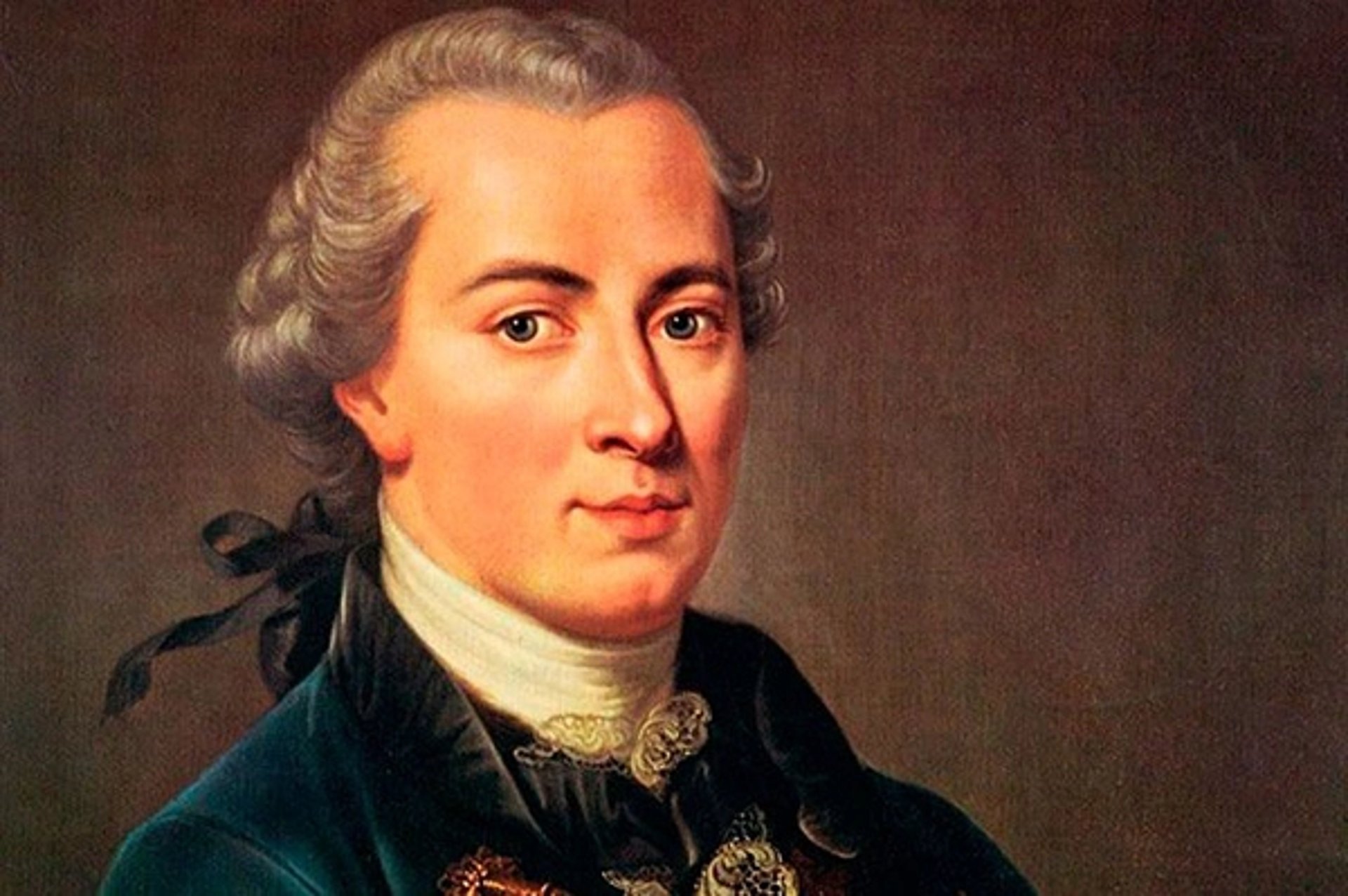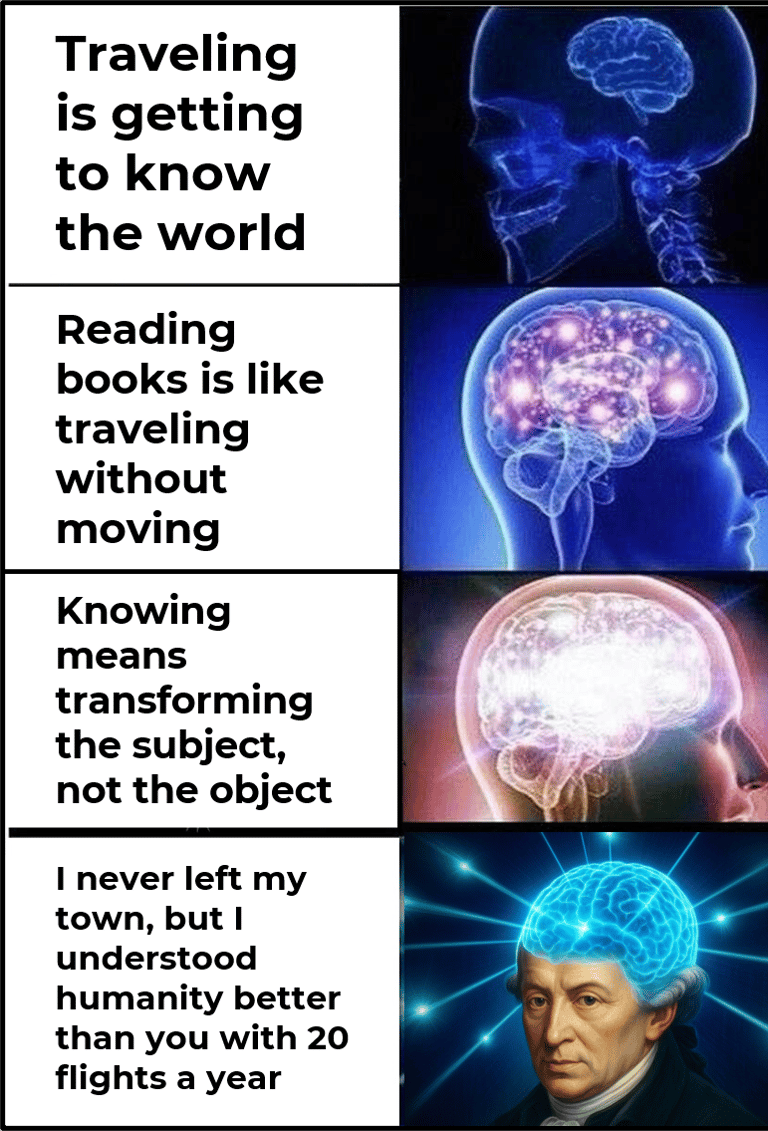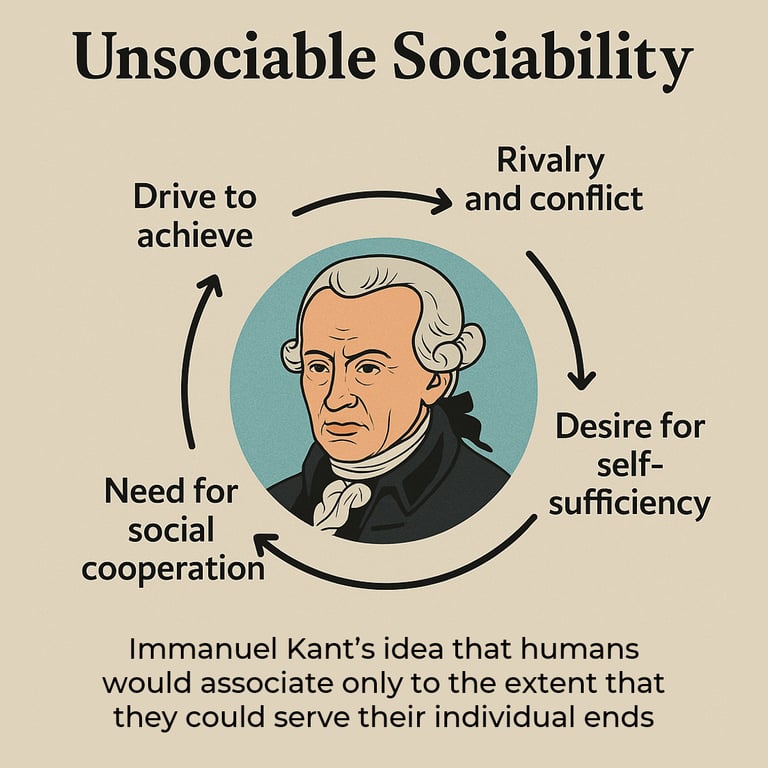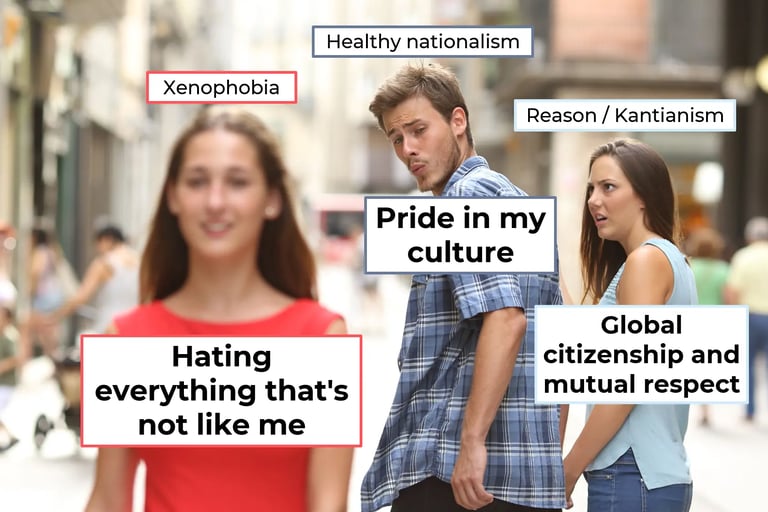
Kant dreamed of a world without wars... and we're still fighting in Twitter threads
What Kant, reason, and cosmopolitanism can teach us about surviving the 21st century (without killing each other in the process).
Edú Saldaña
4/10/20255 min read
Kant, the motionless traveler
Immanuel Kant never left his hometown, but that didn’t stop him from thinking about the entire world. While you're still arguing on Twitter with strangers about international politics without knowing where Lithuania is, Kant was already asking in the 18th century: "What if all humanity shared a single history?"
In an age of wars, colonialism, and ego-trips with crowns, he proposed a radical idea: a universal history with a cosmopolitan sense, where nations cooperate instead of compete. A rare dream in a world where we’re still debating whether migrants have the right to exist. Idealistic? Yes. But also urgent.


Nature’s secret plan: Kant explained our group toxicity before family group chats even existed
Kant believed nature had a hidden plan: for reason to fully develop in the human species. Not in me, not in you (sorry), but in all of us as humanity. But since nature doesn’t take steps without drama, its favorite tool to help us evolve is...
The conflict.
And here comes the first philosophical twist: it's the tension between our need to live in society and our selfishness that forces us to organize. It’s the classic case where chaos makes you grow up. Like when I lived with roommates: I didn’t want to learn to wash dishes, but microbial biology made me.
Kant called it “unsociable sociability”: we need each other to survive, but we can’t stand each other. We come together, yes, but more out of interest than love for our neighbor. Basically, we evolved not because we’re good team players, but because we have no choice but to learn to live together without throwing plates at each other.


Cosmopolitanism: a rational utopia (or a sane kind of madness)
Kant imagined a “confederation of nations” based on shared laws, not armies or walls. It wasn’t about erasing diversity or forcing unity, but about cooperating through difference.
His proposal included:
An international legal framework: A set of shared laws so that no single state can do whatever it wants in the name of sovereignty. Example: International tribunals judging war crimes… and actually enforcing their rulings. Cough cough… Netanyahu. Cough cough… selective impunity.
Respect for human rights: Before the UN or the declarations of rights even existed, Kant was already talking about human dignity. For example, banning slavery or granting asylum to those fleeing conflict. And no, just adding “they/them” in your “crystal-friendly” job ad isn’t enough: real inclusion would mean sign language, braille, and not assuming everyone has WiFi… stop asking me to share internet!
Economic interdependence: When countries depend on each other to survive, they’re less likely to kill each other. China and the U.S.? Rivals, but they don’t shoot (for now) because they share billions in trade. Would you break up with a profitable business partner just because they annoy you? No. You just deal with it… and smile in meetings.
And to those who ask why we should care about this if “I just want to afford my Europe trip,” let me put it this way: Progress without ethics is like teaching P. Diddy to change diapers. It’s useful, but not for the right goal.
Ricky Gervais and Kant: separated at birth
In an interview, comedian Gervais says: "It’s a strange myth that atheists have nothing to live for. It’s actually the opposite. We have nothing to die for. We have everything to live for."
That, dear reader, is basically Kant: freedom implies moral responsibility. In the absence of religious beliefs, the responsibility of living an ethical life falls entirely on the individual, without expecting rewards or punishments in an afterlife. Freedom carries an inherent moral responsibility. And if we know something is wrong, we can’t just say “that’s just how I am” and blame it on our horoscope or retrograde Mercury.
If you want to dive deeper into philosophy with uncomfortable questions, brutal sarcasm, and painful truths, don’t miss Ricky Gervais’s special Humanity on Netflix. It’s a brilliant and raw journey through human stupidity, ego, and laughter as a moral mirror.

Extreme nationalism: how to turn pride into xenophobia in 3 steps (without noticing)
What would Kant say about today’s nationalism? Probably something like: “Nationalism is like each organ of the body thinking it can live without the others. Spoiler alert: it can’t.”
In a world where the pandemic closed borders and migrants are still criminalized, Kant’s vision of global citizenship feels more relevant than ever. Peace is not the absence of war, but the presence of global justice.
Kant also understood that the feeling of belonging to a nation shouldn’t become an excuse to deny others their rights. Nationalism, when it turns into exclusion, loses its identity and becomes a dangerous ideology.
Instead, Kant proposed a rational patriotism: love your country, but not at the cost of despising the rest of the world.
How do we go from national pride to xenophobia without realizing it?
Confusing love for your country with hatred of outsiders. Because nothing screams “I’m patriotic!” louder than wanting to deport the guy who makes the best arepas in your neighborhood.
Believing your culture is the only valid one. If someone eats with their hands, dances strangely, or doesn’t watch the World Cup, clearly they’re a threat and not human (The World Cup is not One Piece, because if they don't watch One Piece, you are allowed to discriminate).
Using the word “identity” as an excuse to discriminate. “They’re not our people,” you say. Oh yeah? Were you born by immaculate conception straight from the National Anthem, or in a hospital like everyone else?


Practical applications of Kant (more useful than your meditation app)
Kant didn’t just philosophize in the abstract—he believed thinking should guide action. Here are a few of his quotes and how we could use them today (no ethics PhD or Ayahuasca session required):
“Freedom is that faculty which enhances the usefulness of all other faculties.”
Use your freedom to think, disagree, and create—not just to scroll. Freedom isn’t picking between two yogurt brands at the store; it’s having the critical sense to question any ideology with a patriotic slogan.“The wise one can change their mind. The fool never does.”
Changing your mind isn’t betrayal, it’s evolution. If you change your mind, maybe you’re not betraying your principles… maybe your stubbornness at the level of a drunken uncle at Christmas.“Education is the development of man to the level of perfection of which his nature is capable.”
Education isn’t about collecting degrees, it’s about learning to live with others. If your résumé is stellar but you can’t listen without interrupting, Kant gives you an F in humanity.
Humanity is neither a race nor a flag. The question is: can we live together without destroying each other?
And what do you think—was Kant a visionary ahead of his time… or just someone who believed in us more than we deserved?
If this made you think, laugh, or want to move to a world without borders, share and post it on social media. And remember: Kant never left his hometown, but his ideas traveled farther than most passports.
Kunan Project
We use humor to break down complex issues, connect communities, and build a more inclusive future
© 2025. All rights reserved.
info@kunanproject.com
